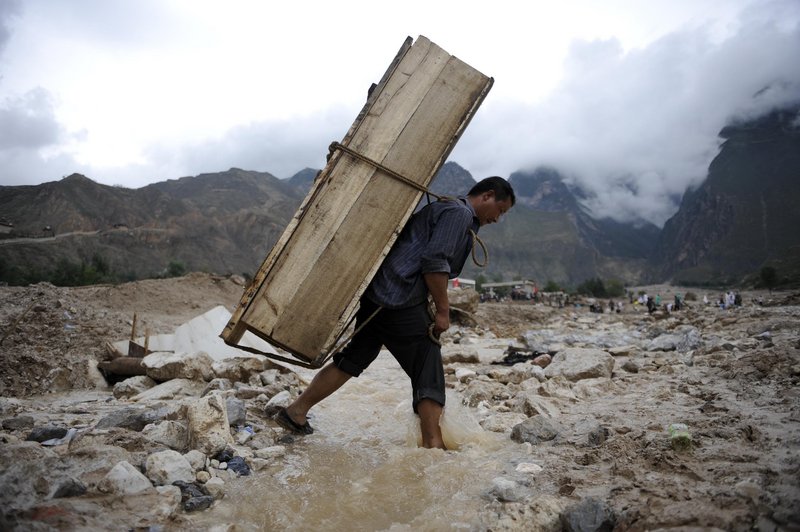ZHOUQU, China – Rain caused new landslides and swelled rivers Thursday in the remote northwestern China region where hundreds have died in massive slides triggered by weekend flooding.
Heavy rains again were forecast in the coming days — up to 3.5 inches was expected today — and the National Weather Center said the threat of more landslides along the Bailong River was “relatively large.”
An overnight deluge triggered mudslides that swept away six houses in Xizangba village, blocked a river near Libazi village, and obstructed a key road used to ferry relief goods, the official Xinhua News Agency said, citing local authorities in Gansu province.
Another mudslide in nearby Tianshui city buried seven people, though two were quickly rescued, Xinhua said. In another part of Gansu, 250,000 residents of Chengxian county faced the threat of flooding as waters rose in the Donghe River, local officials said.
Tents set up as emergency shelters were flooded, and traumatized victims said the storms were a frightening reminder of the deluge that brought on Sunday’s disaster in which three villages in Gansu’s Zhouqu district were swallowed in waves of mud and rubble-strewn water. Hundreds of homes were buried, and the death toll was 1,117 as of late Wednesday.
Xinhua reported that 630 people were missing, but hopes of more rescues were fading as the last two reported survivors were found Wednesday.
Residents said they could hear cries for help coming from collapsed buildings overnight Thursday and some 40 soldiers were sent to search, army officer Zhang Guiquan told Xinhua. “We will seize every chance to find survivors, but it is also important to ensure the safety of rescuers,” he said.
Government officials say the scale of the disaster has made counting the dead all the more difficult, noting whole households have died. Bodies were wrapped in blankets or placed on planks and left on the debris-strewn streets for pickup.
Crews had been using hand tools to pull out survivors but roads reopened Wednesday, allowing in heavy earth-moving equipment and supplies.
Clean drinking water was a primary concern, with most local sources knocked out. State media reported numerous cases of dysentery, but there were no reports of an epidemic outbreak.
Send questions/comments to the editors.



Success. Please wait for the page to reload. If the page does not reload within 5 seconds, please refresh the page.
Enter your email and password to access comments.
Hi, to comment on stories you must . This profile is in addition to your subscription and website login.
Already have a commenting profile? .
Invalid username/password.
Please check your email to confirm and complete your registration.
Only subscribers are eligible to post comments. Please subscribe or login first for digital access. Here’s why.
Use the form below to reset your password. When you've submitted your account email, we will send an email with a reset code.